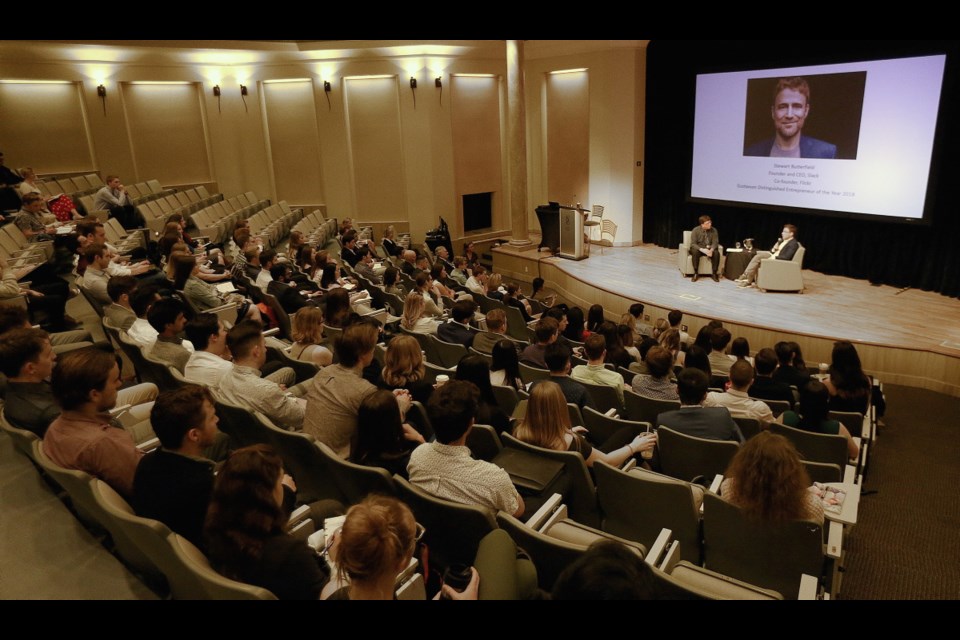Successful entrepreneurs soon realize their dreams are secondary to the needs, desires and even moods of their customers, Stewart Butterfield, a founder of technology businesses, told UVic students Friday.
Butterfield is the University of Victoria Peter B. Gustavson School of Business 2018 Distinguished Entrepreneur of the Year. It’s the first time the award has gone to a UVic grad since it began in 2004.
He is a founder and the CEO of Slack, a software platform for business communications.
Speaking to UVic business students, Butterfield said too many people in business can’t get past their own ego to make a sale or a new contact, when a customer may be just having a bad day and isn’t ready to listen. “Other people do not care about your thing,” said Butterfield. “They have their own universe and they don’t care.”
Butterfield’s honours include being named by Time magazine as one of the 100 most influential people in the world, one of Businessweek’s Top 50 leaders, and Wall Street Journal’s 2015 Technology Innovator of the Year.
Slack is now used by more than nine million people every day. Its customers include Autodesk, IBM, Capital One, Condé Nast and eBay.
Butterfield was born in Lund and moved to Victoria at age five. He went to St. Michaels University School and studied philosophy at UVic, graduating in 1996. He earned a masters at University of Cambridge in 1998.
Prior to Slack, he co-founded Flickr, an image and video-hosting website which was bought by Yahoo in 2005.
In 2009, Butterfield co-founded a game company called Tiny Speck and worked to develop a game called Glitch. By 2012, it became apparent that the game would not be a success and the project was shut down.
Butterfield told UVic students that closing down the game was the genesis of Slack. He and his colleagues talked and agreed they would never attempt another startup without a good, internal communication platform.
“It was a short hop from there to thinking ‘Maybe other people would like that,’ ” he told the UVic students.
The game company had raised $17.5 million to get started and it still had $5.5 million left. It also shut down before designers and executives were burned out, he said.
Butterfield said by 2015, the company had an early version of Slack for people to try. The name was a bit of hurdle and it was tough to convince businesses to adopt. For every 1,000 invitations sent out only 50 to 100 would agree.
“Only a small number of people would convert,” he said. “But it’s like a spark that turns into a flame and then becomes a fire.”
Butterfield has said he would like to see Slack become the Google of business communications.
Doing that will be a matter of maximizing daily returns from communication. Whether it’s meetings, writing and reading emails, composing memos, attending presentations, communication is the bottleneck of production.
“When you are in business, the majority of your time will be spent in the act of communication,” said Butterfield. “If you are a manager it will be 100 per cent of your time.
“So what we are trying to do is increase the level of return we can get from that communication.”



